Ditching Swansea tidal lagoon would be massive blow, says Jones
- Published
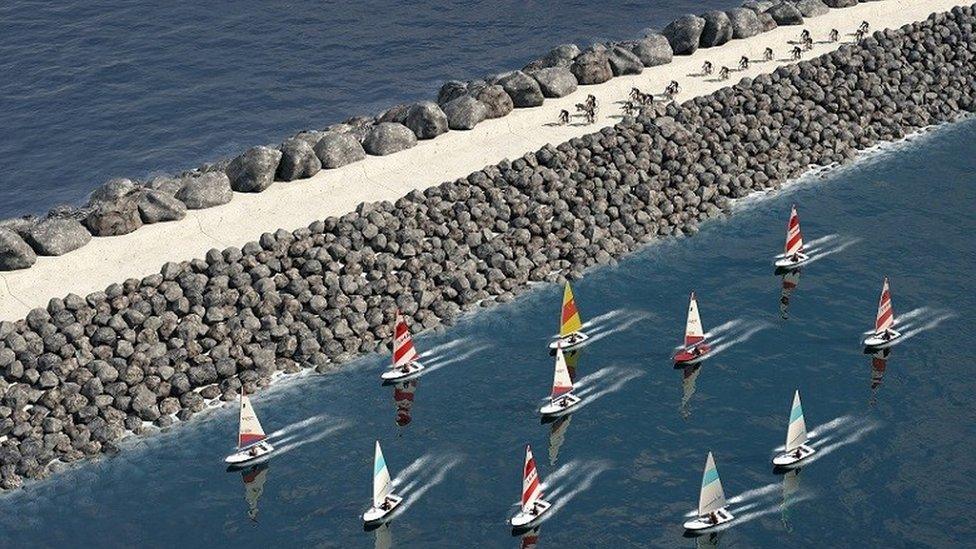
Those behind the scheme say it could provide power for 120,000 homes for 120 years
Rejecting plans for a £1.3bn tidal lagoon in Swansea would be a "massive blow", the first minister has said.
The Financial Times has reported UK ministers will throw out the scheme next week, external which Carwyn Jones said would be "another kick in the teeth" for the city after losing rail electrification.
UK ministers have called the price Tidal Lagoon Power (TLP) wants for the electricity too high, but it is thought to have made a revised offer.
TLP said it was "blind" to the report.
The firm added it has "repeatedly" offered to meet ministers to discuss what price the government would pay for power and claimed the last meeting between officials and ministers "was approximately 12 months ago".
Mr Jones urged UK ministers to make a decision "as soon as possible" to end rumours and uncertainty.
"If these rumours prove to be true, the UK government will be delivering a massive blow to Swansea and Wales more widely - yet another kick in the teeth after their decision to abandon electrification of the train line west of Cardiff," he said.
"The Welsh Government remains committed to the Swansea Bay Tidal Lagoon and we stand ready to provide significant financial backing to help make it a reality."
Mr Jones said a UK government-commissioned report published in January 2017, said the scheme should get the go-ahead, but had "sat on the shelf gathering dust for almost a year-and-a-half".
"Rather than seize the opportunity presented by the project to position Britain as a world leader in a new global industry, the UK government continues to block the development of renewable energy schemes in Wales," he added.
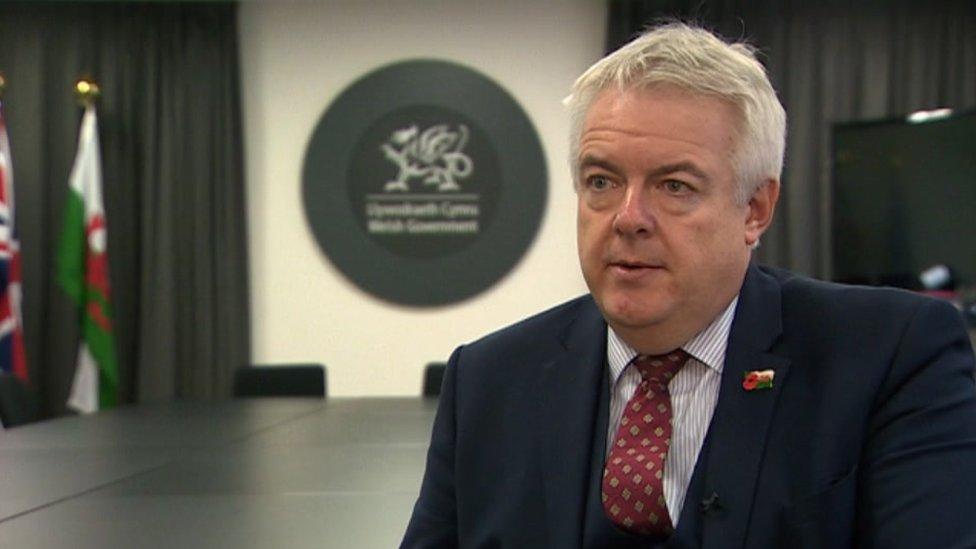
Carwyn Jones says it is time to end uncertainty over the scheme
A TLP spokeswoman said: "We have repeatedly offered to meet BEIS [business, energy and industrial strategy] ministers and have not been given the opportunity to do so.
"We are therefore blind with regards the department's intent on timing or content of any announcement.
"The government's industrial strategy looks for home grown and cheap power and that is what tidal lagoons offer.
"The unit price of power from a pathfinder project at Swansea Bay need cost no more than the unit price of power from Hinkley Point C [nuclear plant], which has already received government backing."
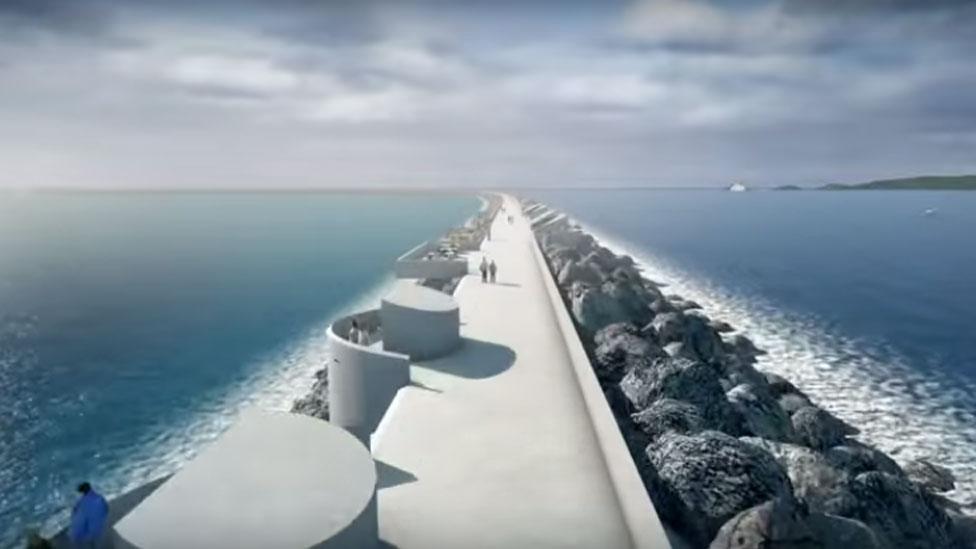
An artist's impression of the lagoon across Swansea Bay
TLP had previously asked for a 90-year contract with the UK government with an average strike price of £89.90 per megawatt hour. The new nuclear power station at Hinkley Point C in Somerset was given a strike price of £92.50/MWh for 35 years.
In January 2018, the Welsh Government offered the project "substantial investment" to help reduce the subsidy required.
But the UK government has continually refused to commit to the project saying it "must be affordable".
Jim Pickard, reporter for the Financial Times, told BBC Radio Wales on Friday: "I was originally told two weeks ago by someone very senior in government is that they had taken a decision that they would not proceed with giving any subsidies to the Swansea Bay project.
"They'll probably say we do like tidal power, but we're unable and unprepared to give subsidies to the scheme at the level that they're requesting.
"They didn't want to just deliver a single piece of bad news so they're trying to wrap it up with some good news for Wales in terms of low carbon energy.
"And that's why I think we'll hear about Swansea at the same time that we'll hear about Wylfa nuclear power station on Anglesey."

Watch Tidal Lagoon Power's video of how the turbines would work
Tidal lagoon: The timeline
2003: Plans first emerge for a £30m tidal power project in Swansea Bay from a green energy charity
2006: Tidal Electric Ltd prepares a scoping report for a lagoon to take the project on but it is put on hold
2012: Tidal Lagoon Power (TLP) unveils its ambition to develop a breakwater and power generation
2013: TLP starts developing its plans
2014: Plans submitted to Planning Inspectorate with a cost of £850m
2015: Proposals get backing of UK government, subject to subsidy agreement - hope it could be operational by 2018
2016: Report warns of impact on fish and Charles Hendry is appointed to lead independent review into £1.3bn lagoon's viability
2017: Hendry review backs the lagoon as a "no regrets" option but the UK government is still to decide
2018: Delays, mostly believed to be over arguments over value for money. Welsh Government also offers substantial investment

Gower Labour MP Tonia Antoniazzi, a member of a parliamentary committee looking into the project, said the scheme's rejection would show "disregard for people and people's lives" and raise questions about the future of renewable energy in the UK.
Plaid Cymru South Wales West AM Dai Lloyd AM said: "The people of Wales are behind this project, the Welsh Government are behind this project and the people of Swansea are behind this project," he said.
Swansea Liberal Democrat councillor Peter Black said dropping the lagoon would be "devastating news for the entire Swansea Bay region" as it would have "created large numbers of high quality jobs with substantial resulting economic benefits for the region".
A spokesman from the Department for Business, Energy and Industrial Strategy said: "As the business secretary told MPs recently, while we have quadrupled the proportion of our electricity that comes from renewable sources since 2010, we have a responsibility to minimise the impact on consumer bills and the Swansea proposal is more than twice as expensive as the Hinkley power station.
"Any decision on the Swansea Bay tidal lagoon project will have to represent value for money for the UK taxpayer as well as the consumer."
- Published1 May 2018

- Published13 March 2018
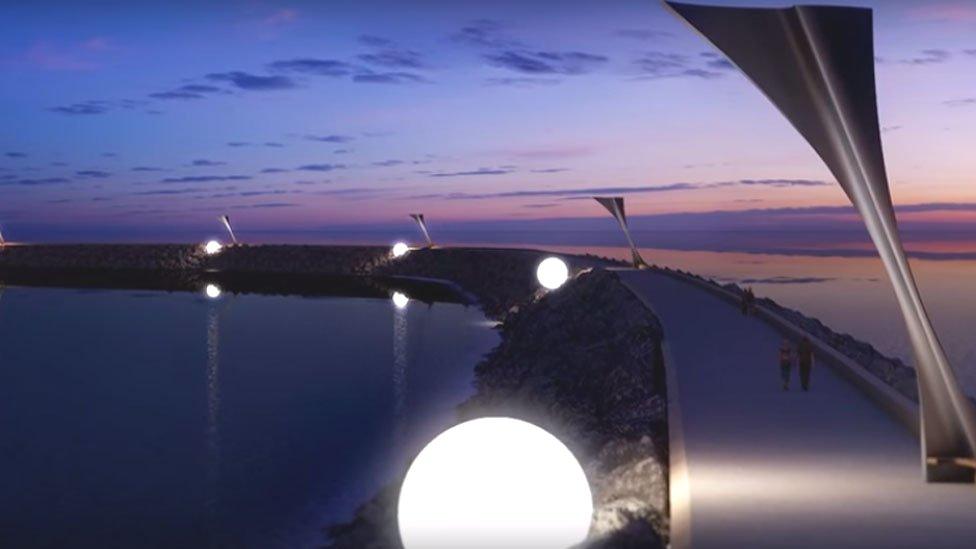
- Published22 February 2018

- Published10 January 2018

- Published10 January 2018
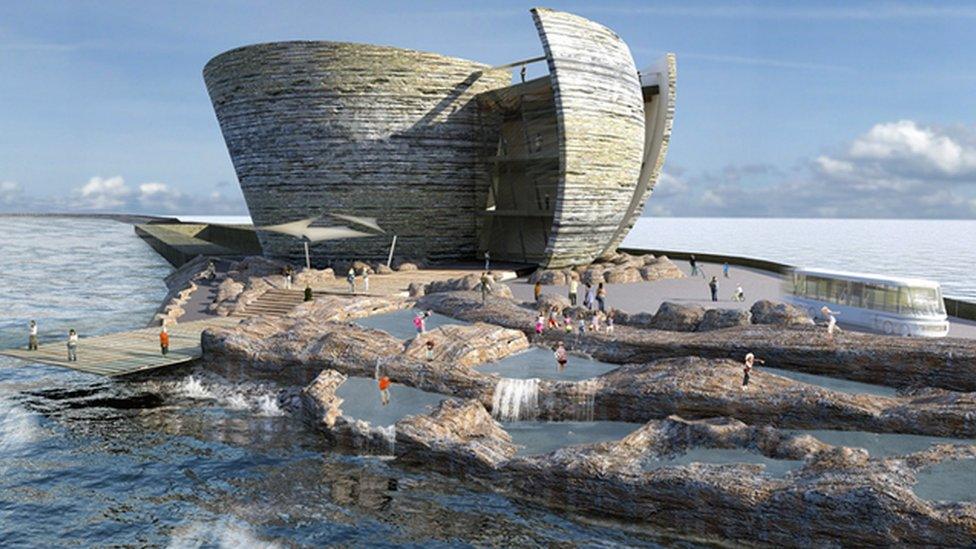
- Published19 December 2017
